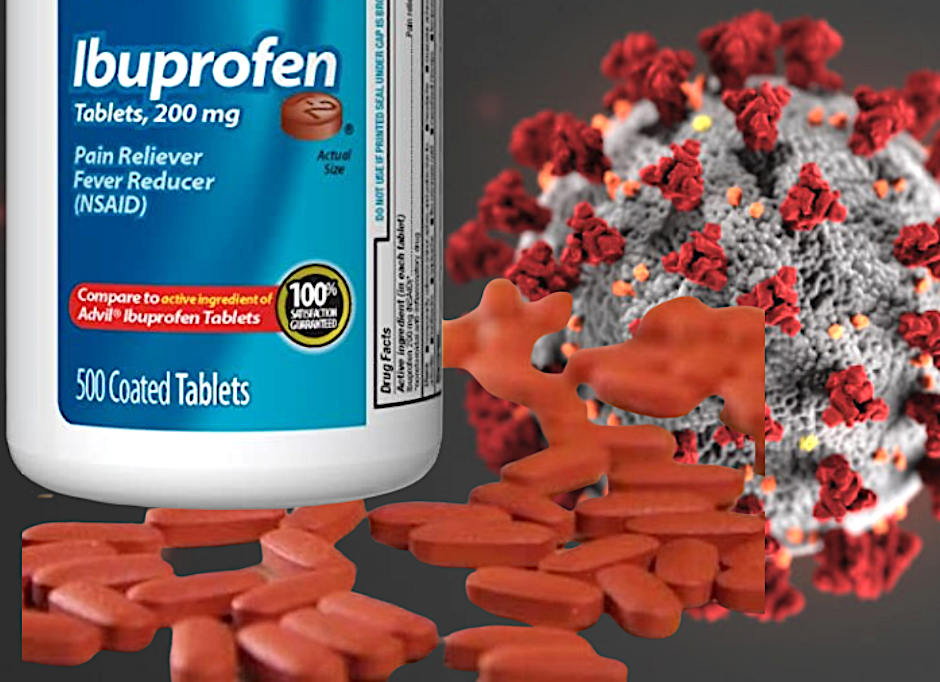
Warnings that taking ibuprofen can cause COVID-19 to spread have gone viral (pun intended.) In fact, I’m getting dozens of videos and text warnings forwarded to me daily! Is there any truth to this? Actually, this information was based on a legitimate study that has ended up getting flooded with biases and misinformation.
On March 11, an article published by The Lancet Respiratory Medicine stated, “Taking ibuprofen could be an aggravating factor for the COVID-19. If you have a fever, take acetaminophen (Tylenol) because ibuprofen stimulates the body to produce an enzyme that allows the virus to more easily invade human cells.”
The World Health Organization(WHO) also stated that ibuprofen should be avoided when treating COVID-19 patients, but they later recanted their statement with an updated announcement, "Based on currently available information, WHO does not recommend against the use of ibuprofen.” The CDC also put out a statement, “Ibuprofen is NOT a concerning factor in treating the virus and shouldn’t be avoided.”
In addition, the European Medicines Agency (EMA) published a statement, “There is no scientific evidence linking ibuprofen and worsened COVID-19.” This organization also noted that it had completed a safety review of ibuprofen after survey results suggested that the drug may worsen bacterial infections. EMA officials stated that there exists no evidence showing an association between ibuprofen and COVID-19 prognosis.
Many conspiracy theorists are saying all of this recanting of the Lancet paper happened because of deep pocket pressure from multibillion-dollar fortune 500 companies that manufacture ibuprofen, GlaxoSmithKline (makers of Advil) and Johnson & Johnson (makers of Motrin.) Actually, that’s not the case.
Just how accurate are the Lancet findings? They were based on the review of just three early sets of COVID-19 cases in China. The authors observed that between 12-30% of these infected patients had high blood pressure and diabetes. The Lancet paper, which investigated whether people with diabetes and hypertension are at an increased risk for COVID-19 infection, explained that human pathogenic coronaviruses bind target cells together using angiotensin-converting enzyme 2 (ACE2). Because ACE2 provides a place on cell surfaces for the coronavirus to attach to and replicate, it’s been theorized that higher rates of ACE2, might be raising the risk of coronavirus infection. Ibuprofen falls into a class of drugs called non-steroidal anti-inflammatory drugs (NSAIDs.) which was believed to cause ACE2 to rise.
Here’s where the viral warnings about ibuprofen fall short. There actually wasn’t any PROOF submitted on ibuprofen increasing the severity of COVID-19. We have to be cautious about jumping the gun and associating a phenomena and diseases when something represents “correlation” and not an actual “causation.” In other words, just because two things occurred at the same time doesn’t prove they’re linked. The connection between ibuprofen and COVID-19 can not be correlated since no statistical relationship has been proven.
However, this doesn’t get ibuprofen off the hook for not being contraindicated for people concerned about getting COVID-19. While the correlation of ibuprofen use causing a proliferation of the coronavirus has not been established, what has been proven is the negative effect the drug has on the gut. In fact, ibuprofen is so destructive on the lining of the gut, people who are diagnosed with IBS (Irritable Bowel Disease,) Crohn’s disease and Colitis are told by their doctor not to take this over the counter drug.
The National Institute of Health (NIH) warn about the possible risks of ibuprofen: "NSAIDs such as ibuprofen may cause ulcers, bleeding, or holes in the stomach or intestine. These problems may develop at any time during treatment, may happen without warning symptoms, and may cause death.” They go on to warn, “The risk may be higher for people who take NSAIDs for a long time, are older in age, or have poor health.” That just so happens to be the same category of people the CDC warns are at a greater risk of being infected by the coronavirus.
Another study by NIH concluded that ibuprofen weakens the intestinal walls and using this drug leads to inflammation of the small intestine.
Considering research shows the gut houses 70 percent of the cells that make up our immune system, while Ibuprofen has not been proven to increase the proliferation of COVID-19, because the drug destroys the lining of our gut, it does lower our ability to fight the disease.
If you would like to know some natural alternatives to ibuprofen, including how to reduce inflammation and pain through diet and supplementation, read my previous article.
About the Author
Dr. David Friedman is the author of the award-winning, #1 national best-selling book Food Sanity, How to Eat in a World of Fads and Fiction. He's a Doctor of Naturopathy, Chiropractic Neurologist, Clinical Nutritionist, Board Certified Alternative Medical Practitioner, and Board Certified in Integrative Medicine. Dr. Friedman is a syndicated television health expert and host of To Your Good Health Radio, which has changed the face of talk radio by incorporating entertainment, shock value, and solutions to everyday health and wellness issues.
Read more hereFOODSANITY.COM .